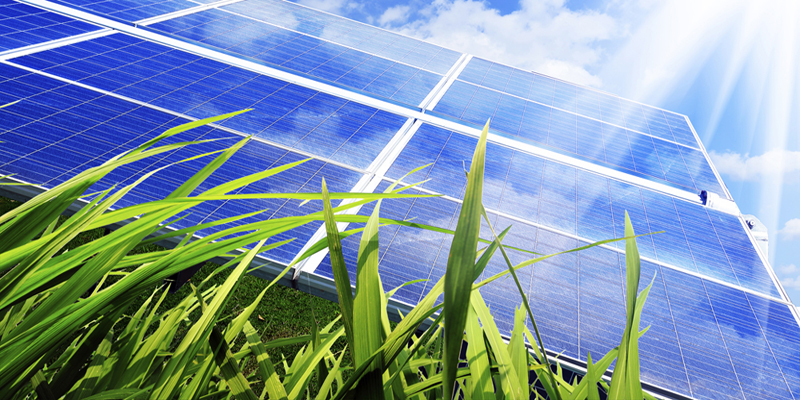Solar Cell Systems and Materials - Study tracks- Master of Science (MSc) in Innovative Sustainable Energy Engineering - 2-years, Nordic Five Tech
Innovative Sustainable Energy Engineering
Innovative Sustainable Energy Engineering
Hovedbilde - Solar Cell - msisee

Important information
Important information
NTNU has had its last admission into this programme in the fall of 2021. You can still apply to the programme through Alto University. Please note that NTNU is no longer a part of this collaboration for any new admissions.
Solar Cell Systems and Materials
Solar Cell Systems and Materials
First year: DTU, Management Engineering, Professor Anne Hauch
Second year: NTNU, Department for Material Science and Engineering Associate Professor Marisa Di Sabatino
Study tracks focus and goals
The overall goal of the study track is to educate MSc level candidates with theoretical knowledge and practical competence, qualified to a professional career in the PV industry, or for PhD level studies in the field. The study track focuses on the fundamental principles behind- and the application and development of- photovoltaic materials and/or devices, and systems.
In the first year at DTU, a broad basis in energy systems, technology and economics will be offered to all students. The fundamentals of solar energy harvesting are provided, in addition to basic courses in semiconductor physics and materials synthesis.
In the second year at NTNU, depending on study line/direction, advanced courses in solid state physics, optics etc. will be offered to students in the physics direction. For students in the materials science direction, courses covering process metallurgical, electro-chemical and chemical methods to synthesize semiconducting and light harvesting PV materials are offered. In addition, courses in PV Si-materials processing such as crystallization, wafering and passivation are available. The year at NTNU contains a 15 ECTS project, in addition to the 30 ECTS MSc project. Depending on project and MSc direction, course choice will be recommended by project supervisor.
Read more about the Study plan online
Course Table
Course Table
1. semester, Technical university Of Denmark (DTU)
1. semester, Technical university Of Denmark (DTU)
- 42002 Modelling and Analysis of Sustainable Energy Systems using Operations Research, 5 ECTS
- 42015 Energy Economics, 5 ECTS
Choose 2 of:
- Fall 47330 Energy storage and conversion (5 ECTS)
- Fall 11108 Building integrated Photovoltaics (5 ECTS)
- Jan 34551 (January) Thin Film Photovoltaics, 5 ECTS
-
Elective courses DTU, e.g.:
- 46205 Feasibility studies of energy projects, 5 ECTS
- 28870 Energy and Sustainability, 5 ECTS
- 47333 Electron microscopy for materials science, 5 ECTS
- 11128 Development of solar energy systems, 5 ECTS
- 34032 Optical properties of solids, 5 ECT
Total of 30ECTS
2. semester Technical university Of Denmark (DTU)
2. semester Technical university Of Denmark (DTU)
Compulsory course:
- 34552 Photovoltaic Systems, 5 ECTS
Elective course DTU, e.g:
- Spring: 11117 Solar heating systems, 10 ECTS
- Spring:10302 Electronic Structure Methods in Material Physics, Chemistry and Biology**, 10 ECTS
- Spring: 31756 High Power Electronics, 10 ECTS
- Spring: 31778 Distributed energy technologies modelling and control, 5 ECTS
- Spring: 10850 Advanced micro- and nanofabrication technology, 5 ects
- Spring: 46230 Power system balancing with large scale wind power, 5 ECTS
- Spring: 47304 Ceramic Science and Engineering, 10 ECTS
- Spring: 47305 Electrochemistry, 5 ECTS
- Spring: 47319 Functional Materials, 5 ECTS
- June: 34553 Applied Photovoltaics, 5 ECTS
*Requires Bachelor in Physics
** Requires advances quantum physics and soli state physics
Total of 30ECTS
3. semester Norwegian University of Science and Technology (NTNU)
3. semester Norwegian University of Science and Technology (NTNU)
- Chose 15 ECTS of Elective courses list
Depending on background, one can choose:
- TFY4300 Energy and environmental Physics 7.5 ECTS
- FY3114 Functional Materials 7.5 ECT
- TFY4255 Materials Physics 7.5 ECT
- TMT4322 Solar Cells and Photovoltaic Nanostructures 7.5 ECTS
- TMT4330 Resources, energy and environment 7.5 ECTS
- TMT4326 Refining and Recycling of Metals 7.5 ECTS
- TFY4530 Solar Cell Systems and Materials, Specialization Project 15 ECTS
(Department of Physics),
or
- TMT4520 Solar Cell Systems and Materials, Specialization Project 15 ECTS
(Department of Materials Science and Engineering)
TOTAL OF 30 ECTS
4. semester, Norwegian University of Science and Technology (NTNU)
4. semester, Norwegian University of Science and Technology (NTNU)
Research areas for projects / master thesis for NTNU-DTU
Research areas for projects / master thesis for NTNU-DTU
Study plan
Master Thesis Information
Master Thesis Information
- Doing Master thesis at NTNU
- For more information or questions, please contact Marisa Di Sabatino
